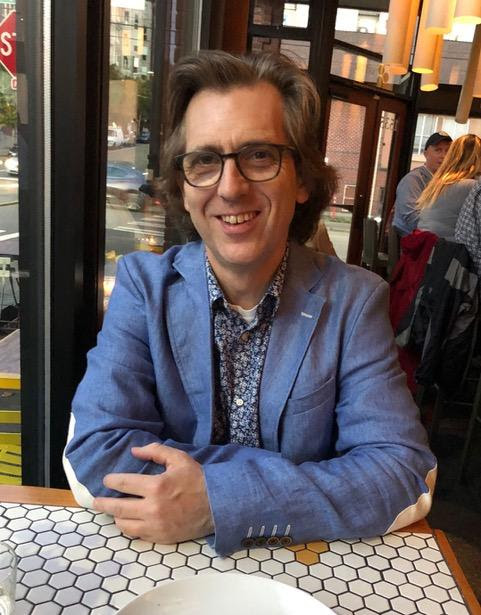In the Spotlight
David Roberts

David Roberts is the parent of YMP alumnus Marco Roberts, and a member of Walden’s Board of Directors. Before moving his family to the Seattle area in 2016, David lived and worked in China for 20 years, most recently as a partner in the Beijing office of O’Melveny & Myers where he practiced corporate and securities law. For a brief period, the four-piece Roberts Family Band rocked the Beijing elementary school and office party circuit with an eclectic mix of Beatles, Cui Jian, and Soundgarden covers until breaking up over creative differences. Having retired from his law career, David spends his time writing fiction, competing in table tennis tournaments around the U.S., and skiing every storm possible in the Cascade Range.
How and when did you get connected to Walden?
I first got connected to Walden in 2014. Our family was living in Beijing at the time. My wife is from Beijing, and both our kids, Marco and his younger sister Sophia, had grown up in Beijing all their lives, our home for 13 years. Connecting with Walden was not intuitive or easy, and it’s amazing that we found it.
At that time, Marco was becoming immersed in music, through his own initiative. He had started composing on his own and when he watched the movie Amadeus, he completely connected with images of Mozart composing by hand. He figured out how to make his own staff paper and printed it out and started composing a chamber symphony all on his own.
We thought, “Okay, this is not normal” because none of us were teaching him, he was teaching himself. We tried to find a composition teacher in Beijing, but it’s very difficult to join that world if you don’t have preexisting connections. I was looking online, and I found Walden among several other programs in the US. Something about Walden connected-it just looked right. I called the office and spoke with Seth, and that was really helpful, but it still sounded pretty daunting. How could we get him from Beijing to rural New Hampshire? Seth also put me touch with an alumni parent who was living in Beijing, whose daughter had attended Walden a number of years before, and she put our minds at ease.
What has been your involvement since then?
Marco first attended Walden when he was 12, and he did five summers in a row, from 2015-2019. Our family was still in China during his first summer, then his second summer we were in transition, moving to the Seattle area. We could tell from the first summer that Marco had found his place-he just loved Walden. We could see that he was developing and growing in the program, and knew it was perfect for him. So my initial involvement was just as a parent. I visited a few summers, not every summer, because even from Seattle it isn’t an easy trip.
Our summer 2020 plans were still up in the air when the pandemic happened. We were struggling with what to do when OYME became an option. He signed up and it was great–I am so glad he had those four weeks. The program was unexpected and improvisational, and it was really well done. Marco composed several pieces, but his piece for Festival Week was really meaningful. He has a deep interest in geopolitics, especially regions that are often overlooked. He composed a haunting piece inspired by Armenian music called Erasure that explores ongoing conflicts among Turkey and its neighbors. Two months after he finished the piece, war broke out in Nagorno-Karabakh between Armenia and Azerbaijan. That piece really showed what Walden did for him–it went from a love of music to using it as a language to interpret and comment on the world around him.
Could you describe a favorite memory or experience from being a Walden parent?
My favorite experience is basically the whole first summer, how improbable it was and then watching it become a reality. Sophia named it “Operation Marco” because there were so many pieces that needed to come together. As a family we went from Beijing to Seattle, where we put Sophia in a different camp and lived out of a basement apartment while our new home was being remodeled, then Marco and I flew to New York, and drove from there up to New Hampshire together. He was very quiet, and I could tell he was nervous. As we got closer, taking winding roads through the countryside, my phone lost reception and I casually remarked, “Wow, this is really remote,” without thinking what Marco was absorbing. Of course, he had grown up in a city of 30 million people, and now we’re in the middle of nowhere without cell service. He started to cry. We talked it through, and I tried to reassure him it would be okay, but he was pretty scared. Finally we arrived at Walden, and I was amazed how friendly and warm the vibe was-it was clearly a special place. There were faculty and staff members greeting students, and they immediately made Marco feel welcome. I stuck around for a few hours, and we met other parents and kids, and he started talking to the other kids, so by the time I left I could tell he was going to be okay.
I was still nervous all summer. That drop-off was a big step for him, but I didn’t know how he was going to handle five weeks so far from home when he had never done a live-away program before. He called about a week later and told me that one of the senior campers, Jane, had brought a Chinese instrument to camp (a zither, I believe) and said if anyone was interested in composing for it, they should talk to her. He asked, “Should I talk to her?” and I said, “Absolutely!” Then I didn’t hear about it for the rest of the summer. We showed up for Festival Week really excited to hear his piece, but he had hardly told us anything about it-when he gets excited about something, he’s so immersed he doesn’t say much. But we saw the program, so we knew his piece would be for this instrument, along with violin and cello. Jane and The Walden School Players played the piece beautifully, and I know I’m biased as a proud parent, but it was the best thing I’d ever heard. I couldn’t believe it. I thought, “This is what he learned in five weeks? This is incredible.” It was so different from what he had been writing on his own before going to Walden. Those pieces were impressive to me, but you could tell he was mostly drawing on Mozart. I had never heard him improvise anything remotely like this piece-it was so unique and drew on both his Chinese upbringing and his love of European music and opera. So that first visit is one of my favorite Walden memories.
How are music and/or creativity part of your life?
I grew up with completely non-musical parents who made a concerted effort to expose me to a lot of music. My mother used to joke about being tone-deaf, and neither of my parents really read music, but they put me in piano and trumpet lessons and I sang in the San Francisco Boys Chorus from age 7-13, which was a great experience. So, I am an amateur musician but can play enough piano to have gotten Marco interested in the instrument from a young age.
Now, creativity for me is mostly writing. I left my law career to pursue writing fiction. I’ve been taking classes at Hugo House in Seattle and working on a novel for several years, which is a difficult project, and I’ve also written several short stories. That has given me an appreciation for how difficult any creative process is-it’s just really hard work. You have to learn craft skills and how to apply them to achieve your creative vision. So a place like Walden, even for an adult musician, is really cool because someone might love music and want to create music, but you have to learn skills too and find a community that supports your creativity. You generally can’t just wing it on your own. Pursuing writing has given me a new appreciation for how difficult it is to be an artist.
What is your hope or dream for Walden’s future?
Don’t fix it if it ain’t broken. There is definitely something to be said for preserving traditions and the way things work, but I like how Walden is innovative at the same time. It’s this very interesting balance between traditions (those unique Walden-y things that have been done for decades) and also being experimental and on the cutting edge, whether it’s digital music, or this past summer turning on a dime to create online programs from scratch that still preserved the Walden feel. My hope is just that Walden keeps going strong, preserves its core traditions, and continues to innovate with the core traditions and its sense of community as the foundation for that growth.
